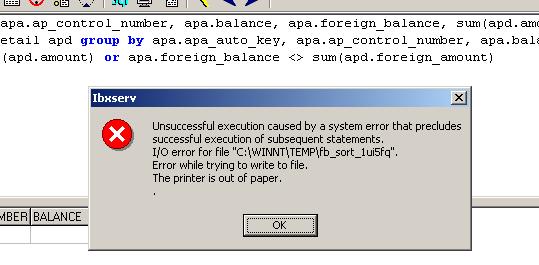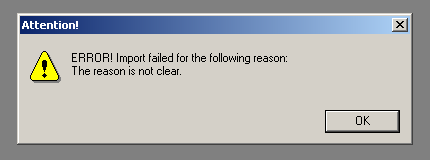Saving a Few Nanoseconds
by in Feature Articles on 2007-04-30Last month, in Saving a Few Minutes, we learned about G.R.G.'s experience with RUNPROG, one of the earliest examples of The Inner-Platform Effect I've ever seen. RUNPROG lived on an ancient supercomputer with an operating system that lacked the concept of search paths. Instead of a simple, four-line enhancement to "search another directory," RUNPROG was a 100,000-line assembly program that essentially did everything that the operating system did.
Although RUNPROG was entirely unnecessary, cost an incredible amount of time and money to maintain, and caused programs to run and load a magnitude slower, the business did not mind. It saved them money in the long run in that it allowed them to bill out even more CPU-time to their timesharing clients. In fact, after three short months of production use, the business had already forgotten the pain endured to create RUNPROG. That was, until Black Tuesday arrived.

 Mar 07
Mar 07
 Making ends meet while attending college is tough. Tuition is ridiculously expensive, books are ridiculously expensive, and food is ridiculously... reasonable, generally. Still, it's hard to afford everything. You could work a crappy part-time job, sell your bone marrow, sign a waiver and let the med students have their way with you, or improvise to make money. Jesse's friend who we'll call "Giuseppe" chose improvisation.
Making ends meet while attending college is tough. Tuition is ridiculously expensive, books are ridiculously expensive, and food is ridiculously... reasonable, generally. Still, it's hard to afford everything. You could work a crappy part-time job, sell your bone marrow, sign a waiver and let the med students have their way with you, or improvise to make money. Jesse's friend who we'll call "Giuseppe" chose improvisation. “Hey, you’re in IT, right,” a frantic fellow in a maintenance jumpsuit asked, barging right into G.R.G.’s cramped little office. G.R.G. shifted his eyes away from the project he was working on – some database for physics students and professors – and began to formulate an affirmative answer. Before he could even complete the word “yes,” the Maintenance Guy jumped in, “’cause, we have a serious problem.”
“Hey, you’re in IT, right,” a frantic fellow in a maintenance jumpsuit asked, barging right into G.R.G.’s cramped little office. G.R.G. shifted his eyes away from the project he was working on – some database for physics students and professors – and began to formulate an affirmative answer. Before he could even complete the word “yes,” the Maintenance Guy jumped in, “’cause, we have a serious problem.”

 Sometimes the best WTFs don't come from without; they come from within. If you think back across the history of your career, you've probably had your share of red-faced, forehead-slapping moments from doing something stupid. You've got some coming up ahead, too. And if you've never made an embarrassing professional mistake, congratulations, you're an oblivious "
Sometimes the best WTFs don't come from without; they come from within. If you think back across the history of your career, you've probably had your share of red-faced, forehead-slapping moments from doing something stupid. You've got some coming up ahead, too. And if you've never made an embarrassing professional mistake, congratulations, you're an oblivious "

 If you haven’t done so already, you will. Soon. It’s inevitable. No matter how careful you are, no matter how meticulous your check-ins, you will eventually be the developer who Breaks the Build.
If you haven’t done so already, you will. Soon. It’s inevitable. No matter how careful you are, no matter how meticulous your check-ins, you will eventually be the developer who Breaks the Build.  "You Tris?"
"You Tris?" Last month, in
Last month, in 

 Keeping employee morale up is a hard thing to do, so businesses do their best to keep spirits up. Maybe a company picnic, maybe you get to wear a Hawaiian shirt to work one day (thanks, soulless employer, I've always wanted to look like a total boob in a Hawaiian shirt), or perhaps a game of friendly competition.
Keeping employee morale up is a hard thing to do, so businesses do their best to keep spirits up. Maybe a company picnic, maybe you get to wear a Hawaiian shirt to work one day (thanks, soulless employer, I've always wanted to look like a total boob in a Hawaiian shirt), or perhaps a game of friendly competition.
 Call me jaded, but every time I'm starting up on a new project as a maintenance developer, I expect the worst. It helps to soften the blow when the code I have to maintain is, in fact, "the worst." Plus it makes it all the better when I get to maintain good code.
Call me jaded, but every time I'm starting up on a new project as a maintenance developer, I expect the worst. It helps to soften the blow when the code I have to maintain is, in fact, "the worst." Plus it makes it all the better when I get to maintain good code.
 Here's a secret about your company's tech department: they hate you. They really, really, really hate dealing with your stupid questions because you're a stupid user who never learns. They're even devising ways to avoid dealing with you.
Here's a secret about your company's tech department: they hate you. They really, really, really hate dealing with your stupid questions because you're a stupid user who never learns. They're even devising ways to avoid dealing with you. "Wait a sec," whispered Chris’s coworker David, "he can’t possibly think this will solve the Build Problem? His idea is completely absurd!"
"Wait a sec," whispered Chris’s coworker David, "he can’t possibly think this will solve the Build Problem? His idea is completely absurd!"
 I was never able to wrap my mind around academic tenure. Though I certainly understand the desire for "academic freedom," a system that provides an "unfireable" designation, regardless of job performance, seems like it might have a bit of an impact on, say, job performance. Perhaps I’m just biased from my first experience with tenure: Yes Alex, we realize that 80% of students drop his course, and that he often misses lecture, and that he occasionally shows up smelling of bourbon, but please understand: he’s a tenured professor. And by the way, that did not make me feel any better about spending $1,400 on a completely worthless class.
I was never able to wrap my mind around academic tenure. Though I certainly understand the desire for "academic freedom," a system that provides an "unfireable" designation, regardless of job performance, seems like it might have a bit of an impact on, say, job performance. Perhaps I’m just biased from my first experience with tenure: Yes Alex, we realize that 80% of students drop his course, and that he often misses lecture, and that he occasionally shows up smelling of bourbon, but please understand: he’s a tenured professor. And by the way, that did not make me feel any better about spending $1,400 on a completely worthless class. We all know the rules for good passwords. They should be at least 90 characters long, have no recognizable words or phrases, consist of 30% lowercase characters, 30% uppercase characters, and 40% special characters, and they should be changed daily, if not hourly. Where I work, if you forget your password, you're fired on the spot and recommended for execution.
We all know the rules for good passwords. They should be at least 90 characters long, have no recognizable words or phrases, consist of 30% lowercase characters, 30% uppercase characters, and 40% special characters, and they should be changed daily, if not hourly. Where I work, if you forget your password, you're fired on the spot and recommended for execution.